President Barack Obama has appointed Marta Tienda, Princeton’s Maurice P. During Professor in Demographic Studies, a professor of sociology and public affairs in the Woodrow Wilson School of Public and International Affairs, and PLAS associated faculty member to the President’s Advisory Commission on Educational Excellence for Hispanics. Tienda was sworn in on May 26. The commission is tasked with advising Obama and U.S. Secretary of Education Arne Duncan on how to improve educational opportunities and outcomes for Hispanics.
Author Archives: Kai Laidlaw
Ricardo Piglia ganó el Rómulo Gallegos
Por su novela Blanco Nocturno, se quedó con la XVII edición del premio, el más prestigioso de América latina. El ganador se conoció hoy, en Caracas, y entre los finalistas hubo seis argentinos.
Juan José Saer manuscripts, 1958-2004 at Princeton University Library
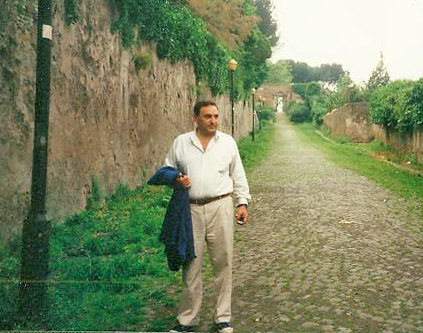
The Manuscripts Division has recently added the manuscripts of Argentinean writer Juan José Saer to its premier collection of archives, manuscripts, and correspondence by Latin American writers and intellectuals. The collection contains numerous notebooks, notes, and drafts of Saer’s novels, essays, short stories, poems, and interviews. Several items in the collection are unpublished. Also included are background materials for Saer’s posthumous novel, La Grande, and some photographs. A detailed finding aid is already available.
Juan José Saer, the son of Syrian immigrants to Argentina, was born in Serodino, a town in the province of Santa Fé, on June 28, 1937. He studied law and philosophy at the Universidad Nacional del Litoral in Santa Fé, and taught film history and criticism at the same institution. He moved to Paris in 1968, where he taught literature at the University of Rennes, and lived in that city until his death in 2005. Although Saer spent most of his literary life outside Argentina, much of his fiction was set on the area of northern Argentina known as el Litoral. Among his literary works are the novels Cicatrices (1968), El limonero real (1974), Nadie, nada, nunca (1980), El entenado (1983), La ocasión (1988), La pesquisa (1994), and the book of poems El arte de narrar (1977). Saer is considered by some critics to be the most important Argentinean writer of the post-Borges generation.
Photo caption: Photograph of Juan José Saer [Juan José Saer manuscripts, Box 13, Folder 9].
Digital Latin American posters collection grows
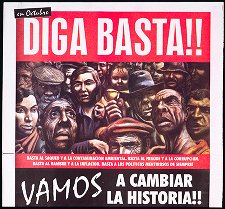
The posters included in this new digital project were created by a wide variety of social activists, non-governmental organizations, government agencies, political parties, and other types of organizations across Latin America, in order to publicize their views, positions, agendas, policies, events, and services. Even though posters produced in Argentina, Bolivia, Chile, Ecuador, Mexico, and Venezuela are the most abundant among the more than two thousand currently available in the site, almost every country in the region is represented. In terms of topics, some of the best represented are human rights, elections, gender issues, indigenous issues, labor, ecology and environmental issues, development, public health, and education.
The Latin American Posters Collection is a component of the larger collection of Latin American ephemera that Princeton University Library has developed since the 1970s.
View the Latin American Posters Collection at Princeton University Library
Image caption: Diga basta! Vamos a cambiar la historia! Movimiento Asambleas del Pueblo. Partido de las Asambleas, Argentina
Professor Bruno Carvalho quoted in The New York Times (article on Maracanã stadium)
“Brazil’s Soul, in Form of a Stadium”
RIO DE JANEIRO — Generations of Brazilians have grown up in the Estádio Jornalista Mário Filho, known around the world as the Maracanã. Built for the 1950 World Cup and at the time the largest stadium in the world, it became an instant national landmark, a symbol of Brazil’s soccer-centric culture.
PLAS concentrator Alissa Escarce ’11 awarded the Labouisse Prize
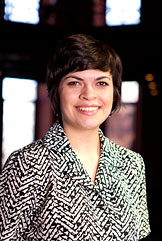
PLAS concentrator Alissa Escarce ’11 has been awarded the University’s Henry Richardson Labouisse ’26 Prize, which will allow her to devote a year of service and research related to migrant workers’ rights.
The Labouisse fellowship provides $25,000 to each recipient to support research in developing countries by graduating seniors who intend to pursue a career devoted to problems of development and modernization. The prize was established in 1984.
Escarce, a history major pursuing a certificate in Latin American studies, will spend the year in Mexico working with Centro de los Derechos del Migrante (CDM), a transnational workers’ rights law center. She will help expand the capacity of a new CDM office in the southern Mexican state of Oaxaca by assisting with research on legal cases, preparing educational materials for outreach efforts, including workshops and a radio show, and performing administrative duties. Escarce also will document the effects of the United States’ H-2 temporary visas on Oaxaca’s indigenous Mixtec community, in part through interviews with local organizers, workers and their families.
Congratulations to Noam Lupu, who received the Porter Ogden Jacobus Fellowship
Noam Lupu (Politics) is one of four doctoral students who received the Porter Ogden Jacobus Fellowship. Lupu, who frequently visits relatives in Argentina and Chile, became interested in the breakdown of Latin American political parties when he witnessed the breakdown of the Argentine radical party in the early 2000s.
Alumni News: An update from Luis Orcí Gandara *68
Yo inicié mi trabajo en la CNDH como “Titular del Órgano Interno de Control”, o sea el Chief Auditor and Comptroller de la CNDH, donde estuve en esa posición aproximadamente 9 años, con un staff de 40 personas para dar seguimiento a las actividades de la CNDH, tanto en su oficinas centrales en la Cd. De México como las de las oficinas foráneas que tenemos en todas las ciudades de los estados fronterizos de México, tanto en el Norte como en el Sur, así como en las ciudades situadas en las rutas de los migrantes Centroamericanos en camino a los EE UU., que necesitan mucho apoyo por los abusos a los que están expuestos por el crimen organizado, algunos pobladores mexicanos abusivos y hasta por autoridades municipales corruptas.
Pictures from Freud Conference Dec. 3 and 4
Thank you to everyone who attended the conference “Sigmund Freud and 20th Century Culture” on December 3rd and 4th. It was a great success. Pictured are Rubén Gallo, Susannah York, Robert Tobin, and Max Hernández. Photos courtesy of Robert Tobin.
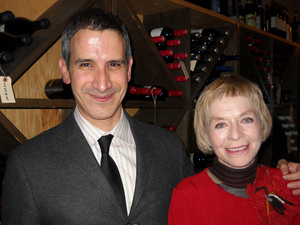

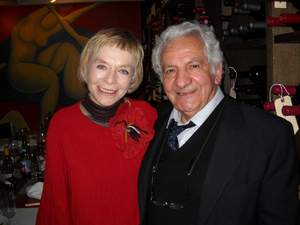
“Prize in Hand, He Keeps His Eye on Teaching”
Five days after the Peruvian novelist Mario Vargas Llosa won the Nobel Prize in Literature, he walked into a Princeton classroom where 25 students awaited their weekly seminar on the magical realism of the Argentine writer Jorge Luis Borges.
And then, said one astounded undergraduate, he pretended nothing had happened.
“Thank you very, very much,” he said, smiling broadly, according to students who were there and had presented him with a card and a spread of baked goods. “We’ll eat this during the break. But for now, let’s start class.”
